The recent approval by the Chamber of Deputies of the Bill to regulate sports betting in Brazil has generated widespread repercussions in all sectors involved with the industry. Although the bill has yet to be reviewed by the senators, it is essential to analyze how what will be one of the largest betting markets in the world will operate.
From his editorial at BNLData, Magnho José highlighted that the refusal to lower the tax for bookmakers, set at 18%, “could jeopardize online betting and gaming operations”.
The expert broke down the actual tax burden that companies that decide to establish themselves in sports betting will have to face. In addition to the established 18%, Magno pointed out, this will be added to a rate of between 13% and 16% for other taxes including Social Contribution on Net Income (CSLLL), Brazilian Corporate Income Tax (IRPJ), Insurance Premium Tax (IPS), Social Security Funding Contribution (Cofins), and Municipal Service Tax (ISS), plus a fixed subsidy of up to BRL 30 million (about $6 million) for only three years of operation (BRL 10 million – $2,000,000 – per year or about BRL 834,000 – about $170,000 – per month).
“In short, the operator will have to work extremely hard in just three years to make viable a business with reduced product attractiveness, low probabilities, taxation above 32%, and promotional limitations, while having to pay off the investments, the value of the subsidy and the monthly payment of the Inspection Fee. It’s going to be tough!”, the editor of BNL Data stated.
José Manssur and Adolfo Viana
From the Brazilian government, other voices were raised and defended the project that was born with the Provisional Measure enacted by President Lula da Silva in July.
The advisor to the Ministry of Finance, José Manssur, spoke with BNLData about Bill 3626/23: “The approval of the bill in the House was the result of a broad and productive debate between the Ministry of Finance and the rapporteur Adolfo Viana, with his highly qualified technical team. In the democratic process, each party certainly gives up something to reach a consensus, and the approval of the bill reflects this, so the Ministry of Finance was satisfied with the outcome and is ready to continue discussions, now with the Senate.”
Manssur also said that although the ministry expects to start receiving the first licenses only in 2024, it already has a set of ordinances ready to regulate the modality.
On the other hand, in dialogue with Games Magazine Brasil, the specialists in gaming law, Filipe Senna (partner of Jantalia Advogados) and Tiago Gomes (partner of Ambiel Advogados), affirmed that Brazil is now positioned as one of the main regulated markets in the world.
“It would be a mistake to assume that the Ministry of Finance had the option of not regulating betting, given the text of Article 29, paragraph 3, of Law 13,756/2018. There is a forceful and mandatory rule that determines that the Ministry of Finance regulates the operation of fixed odds betting in Brazil, so I don’t think it would be an option not to do so,” Gomes commented.
For his part, Senna added: “Both the Provisional Measure and the Bill include criteria that go beyond taxation. Among them, the issue of consumer protection and the guarantee of their rights, especially in the Bill, where many players and bettors found it difficult to demand possible rights, payments, and challenge problems with sports betting operators.”
Celso Sabino
One of the big beneficiaries of the changes set forth in the bill is the Ministry of Tourism, which will receive 4% of the proceeds from sports betting sites and online casinos.
“It’s going to depend a lot on the activity and the extent of the collection that the Treasury and Receita Federal achieve next year, but my personal calculations suggest that we will have around BRL 500 million to 1 billion (between $100 million and 200 million) for tourism as a whole, between the ministry and Embratur to undertake public policies,” stated Celso Sabino, in charge of the portfolio.
Hazenclever Lopes Cançado
For his part, Hazenclever Lopes Cançado, President of Loteria do Estado do Rio de Janeiro (Loterj), in his analysis for Games Magazine Brazil assured that the high taxation and the authorization of only three years of operation “favor the state lotteries, especially the licenses granted by Loterj”, which is “the counterpoint to the Union, stimulating the formalization of the sector in Rio de Janeiro”.
Some criticisms also came from Congress, such as that of Senator Eduardo Girão (Novo-CE), who said: “about the dangers of sports betting and pointed out that compulsive gamblers tend to commit various crimes and frauds to finance their addiction”. According to Girão, experts on the subject agree that this type of gambling is “one of the biggest gateways for laundering dirty money from corruption and drug trafficking.”
Original article: https://www.yogonet.com/international/noticias/2023/09/15/68791-brazil-approval-of-bill-to-regulate-sports-betting-stirs-conflicting-opinions

















